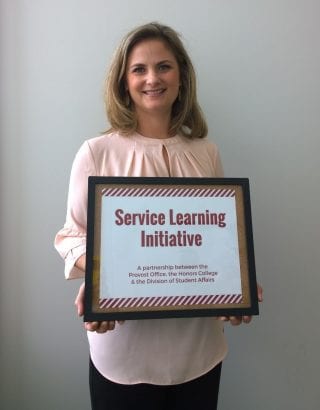Meet Professor Lisa Bowers, assistant professor of Communication Disorders. She is teaching a newly-designated service learning course Language, Learning and Literacy (CDIS 5273). By adding a service learning component to Language, […]
Meet Professor Lisa Bowers, assistant professor of Communication Disorders. She is teaching a newly-designated service learning course Language, Learning and Literacy (CDIS 5273).
By adding a service learning component to Language, Learning and Literacy, UofA graduate students will have the opportunity to screen and assess the language and pre literacy skills of local children who are from low income homes. Graduate students will gain application-based skills for many knowledge-based concepts discussed in class. Additionally, the service learning component will provide graduate students opportunities to interact and collaborate with community partners (specifically Head Start centers) and current service providers (e.g., SLPs who work at the Northwest Arkansas Educational Cooperative).
The role of the speech language pathologist in providing assessment, prevention, and intervention for language-based literacy problems will be discussed. Students will participate in screening and assessment procedures for children at risk for language and literacy delays. Students in this course are expected to demonstrate an understanding of: skills related to reading and writing development, different types of literacy assessment, preventative measures for children at risk for difficulties with literacy, and appropriate strategies for literacy intervention for different age groups. Adding a service learning component where students are required to screen and assess local children who are at risk for language and literacy delays will solidify many of the concepts we discuss throughout the course.
Additionally, the service learning component will provide U of A students opportunities to interact and collaborate with community partners and current service providers in the field of communication disorders. Graduate clinicians will screen children who attend local Head Start programs utilizing a norm-referenced screener. The clinicians will score the assessment protocol and make appropriate referrals as needed. Head Start Centers are required by law to screen all students. Typically, screening procedures are completed by classroom teachers; however, it is difficult to complete in a timely matter, as they must also provide instruction in the classroom and keep strict teacher/student ratios. Our graduate clinicians are trained to administer norm-referenced assessments and the opportunity to partner with Head Start locations in a systematic way would benefit both Head Start as well as University of Arkansas graduate clinicians.
When graduate students are admitted to the CDIS program, they are required to have a bachelor’s degree in Communication Disorders or have completed a post-baccalaureate curriculum of 33 hours of CDIS undergraduate courses. Upon entering the graduate program, students attend an intensive training program prior to the start of the fall semester to learn about on and off campus clinical procedures. In addition, before going to any off-campus placements, students are required to complete formal Health Insurance Portability and Accountability Act (HIPAA) training, child maltreatment training, and follow all requirements of potential placements sites (including TB Skin tests, background checks, etc. if applicable). While interacting with off-campus communication partners, students are in constant contact with licensed Speech-language Pathologists, all of whom hold their certificate of clinical competence, who have committed to answering students’ questions in
a timely manner.
